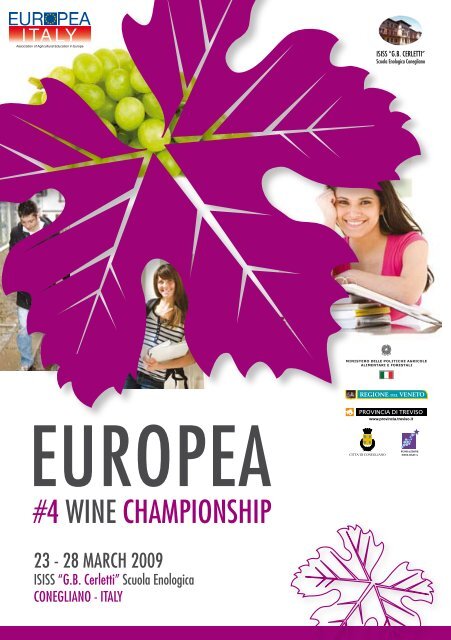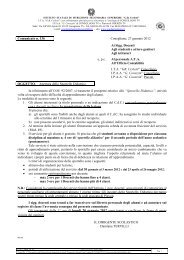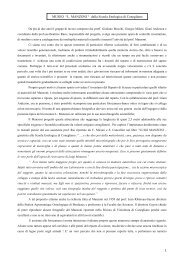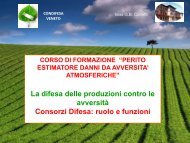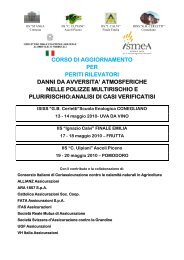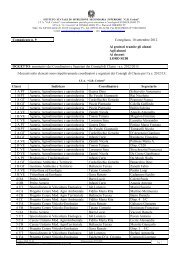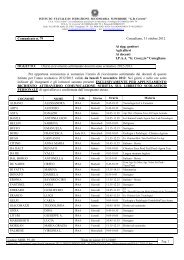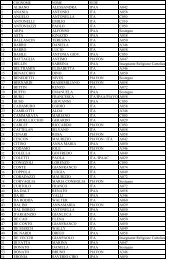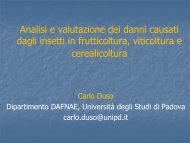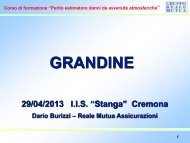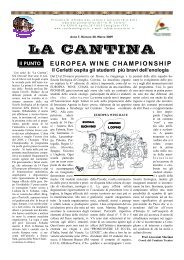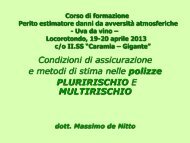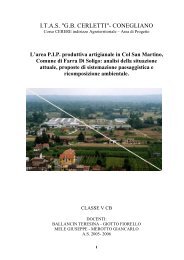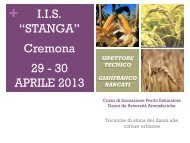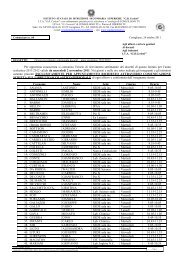#4 WINE CHAMPIONSHIP
#4 WINE CHAMPIONSHIP
#4 WINE CHAMPIONSHIP
You also want an ePaper? Increase the reach of your titles
YUMPU automatically turns print PDFs into web optimized ePapers that Google loves.
EUROPEA<br />
<strong>#4</strong> <strong>WINE</strong> <strong>CHAMPIONSHIP</strong><br />
23 - 28 MARCH 2009<br />
ISISS “G.B. Cerletti” Scuola Enologica<br />
CONEGLIANO - ITALY
EUROPEA<br />
<strong>#4</strong> <strong>WINE</strong> <strong>CHAMPIONSHIP</strong><br />
The 4th Europea Wine Championship,<br />
is an important opportunity for young people from different countries to meet,<br />
get to know one another and acquire new skills through competition in practical tests.<br />
This meeting, unique in its kind, is an expression of the desire of a more united Europe in which the<br />
youngest generations can meet easily and joyfully, exchanging their own knowledge.<br />
I’m sure the event will take place in a relaxed atmosphere and I wish everybody a pleasant<br />
stay among our charming hills.<br />
Damiana Tervilli<br />
ISISS “G. B. Cerletti” School director
EUROPEA<br />
<strong>#4</strong> <strong>WINE</strong> <strong>CHAMPIONSHIP</strong><br />
Nowadays we can talk about “agricultural Renaissance” only thanks to<br />
the contribution of the young people.<br />
Agriculture needs them and their new ideas, professionalism and generosity .<br />
Young people are aware that in this hard moment of crisis, agriculture can and must become again the<br />
engine of our economy, particularly in those areas -like Marca-,<br />
able to enhance and promote the rich oeno-gastronomic heritage.<br />
One of my priorities is to support and promote all the initiatives of the young<br />
entrepreneurs who must be encouraged by all means.<br />
The new generations are ready to experience this noble profession, on the basis of their<br />
serious and detailed studies and training.<br />
Schools like Cerletti Oenological Institute, with its 132 years of history,<br />
provide a key contribution in spreading the knowledge through the generations,<br />
enriched by new studies and findings.<br />
We therefore have to support initiatives like the European student Championship,<br />
at its fourth edition, being an important chance for exchanging views with other schools and traditions,<br />
while always being aware of our identity.<br />
Our wine is our culture, a way to make our history known. The colour of the DOC Prosecco led the<br />
beauty of the hills of Conegliano all around the world.<br />
My task is to defend the features and the differences linked to a specific territory. That’s why we decided<br />
to protect the designations being the core of the agro-food heritage of every country.<br />
Only the love for their origins and the roots allows people to know and appreciate different cultures.<br />
Luca Zaia<br />
Minister of agricultural food and forestry policies<br />
and<br />
Chairman of the Oenological and Agricultural Teaching Foundation
The Veneto countryside, both flat and hilly, is often<br />
characterized by the beauty and the magnificence<br />
of the vineyards that not only are a prevalent<br />
element of the landscape, but in a very<br />
eloquent way tell the story of the agricultural tradition<br />
of our territory. Above all the oenological<br />
production represents unquestionably a prerogative<br />
of the culture in Veneto Region as well as a<br />
strong point of the local economy. As a matter of<br />
fact Veneto produces very fine wines, appreciated<br />
throughout the world and has reached the<br />
primacy in the production of D.O.C. wines, i.e.<br />
wines with controlled appellation of origin, together<br />
with wines with controlled and guaranteed<br />
appellation of origin (D.O.C.G.). They are really<br />
very important, because they recognize and guarantee<br />
the quality and the typicality of products<br />
traded at national and international levels.<br />
In our region wine is objectively a passion,<br />
always throbbing in the soil, in the blood and in<br />
the heart of those who for generations have been<br />
dealing with vine cultivation. But not just this.<br />
It is a passion which expresses the spirit of the<br />
territory so well and of those who produce and<br />
consume it.<br />
For this reason I consider this European competition<br />
particularly interesting, as it brings young<br />
people from fourteen countries and 30 oenological<br />
schools to Veneto. A meeting that features<br />
students engaged in the scheduled competitions<br />
and offers them an educational and cultural insight,<br />
allowing a close knowledge of our territory,<br />
of entrepreneurial activities and authoritative<br />
personalities of the sector.<br />
And then a warm welcome to those who have<br />
taken part with commitment to the accomplishment<br />
of this event; I hope the participants in the<br />
fourth edition of the Europea Wine Championship<br />
will recognise the poetry of wine and of the Veneto<br />
territory, and get the success they deserve.<br />
Giancarlo Galan<br />
President of Veneto Region<br />
I am really pleased to extend my greetings to<br />
the participants in the fourth edition of the Europea<br />
Wine Championship that will take place at<br />
“Cerletti” Institute in Conegliano. A competition<br />
for Oenological schools from all over Europe,<br />
consisting in viticulture, theoretical and practical<br />
tests, oenology, wine tasting, and vine growing<br />
culture. First of all, I would like to give a warm<br />
welcome to all the students that will live these<br />
five days in the very heart of the Prosecco hills.<br />
In fact, “Cerletti” Institute is the oldest oenological<br />
school in the world, an institute where the<br />
oenological art is present in all its aspects, from<br />
secondary education to university courses and<br />
even post-graduate masters. An internationally<br />
renowned school, where students come to study<br />
from all over Italy and from abroad. Ours is a<br />
land where wine is culture, where the art of vine<br />
growing is passed down from generation to generation,<br />
thus producing precious and renowned<br />
wines from our five doc areas.<br />
Thus I hope that the students participating in the<br />
Europea Wine Championship can fall in love with<br />
our land. And I wish everyone the best success<br />
in this event.<br />
Leonardo Muraro<br />
President of the Province of Treviso<br />
The link between the city and its schools, especially<br />
with ISISS “Cerletti”, has produced<br />
extraordinary results over the years, that have<br />
made Conegliano a point of reference at a regional<br />
level. With the fourth edition of Europea Wine<br />
Championship some young people coming from<br />
30 schools in 14 countries can meet and compete<br />
on different school subjects, exchange their<br />
knowledge and experiences and practice their<br />
skills. The contest will consist of a series of theoretical<br />
and practical competitions on viticulture,<br />
oenology and wine tasting. Furthermore, English<br />
is the official language, the knowledge of which<br />
is considered essential as these young people will<br />
be protagonists of their profession at a national<br />
and European level. Conegliano, situated in the<br />
heart of the Prosecco area, has a centennial tradition<br />
in vine growing and wine making; thanks<br />
to this initiative our town will further enhance its<br />
role as a milestone in the field of high quality<br />
educational training, ranging from secondary<br />
education to post-graduate masters. The city of<br />
Conegliano is pleased to welcome the students<br />
and the teachers arriving from different parts of<br />
Europe to take part in this contest. Here they will<br />
find adequate facilities and competent staff who<br />
will make their short stay pleasant and will allow<br />
excellent performances in the various competitions<br />
on the programme. On behalf of the Municipal<br />
Administration I would like to thank the Oenological<br />
School, its Director, Ms Damiana Tervilli<br />
and the school staff for the commitment and high<br />
profile of this initiative, pride of an Institute which<br />
is the alma mater of all those qualified oenologists<br />
who have contributed to the extraordinary success<br />
of our wineries all over the world.<br />
Alberto Maniero<br />
The Mayor of Conegliano<br />
EUROPEA<br />
<strong>#4</strong> <strong>WINE</strong> <strong>CHAMPIONSHIP</strong>
ISISS G.B. Cerletti<br />
Headquarters:<br />
Via XXVIII Aprile 20, 31015 Conegliano TV<br />
Ph.: 0438/61421-61524 Fax 0438/450403<br />
e-mail: scuolaenologica@isisscerletti.it<br />
site: www.scuolaenologica.it<br />
The Oenological School of Conegliano<br />
It is a school rich in history tightly linked to the<br />
development of agriculture and viticulture in<br />
Veneto and to the first historical and political<br />
events dating back to the birth of Italy. It was<br />
established on 9 July 1876 with a R. D. (Royal<br />
Decree) by king Vittorio Emanuele II; Mr. G. B.<br />
Cerletti was appointed the first director. With the<br />
R. D. of 31/08/1933 the school became a Technical<br />
Institute for Agriculture specialized in vinegrowing<br />
and oenology. After World War II the<br />
school increased its prestige under the direction<br />
of Professor Luigi Manzoni, a researcher whose<br />
studies on vine genetics, particularly Incrocio<br />
Manzoni, are still well known and appreciated.<br />
The Institute does not only live on its glorious<br />
past, its staff design, research and innovate;<br />
now in its “campus” there are a Vocational Institute<br />
for Agriculture, a Technical Institute for Agriculture,<br />
a branch of the Faculty of Agriculture<br />
of the University of Padua (to achieve a degree<br />
in Science and Technology of Vine-growing and<br />
Wine-making ), the Regional Centre for viticulture,<br />
oenology and grappa of Veneto Agriculture,<br />
the Piave DOC Wine Consortium, the Eastern<br />
Veneto Association of Oenologists to promote<br />
efficient collaboration of studies, technical and<br />
scientific research, wine and food marketing.<br />
The Province of Treviso has been committed<br />
for years in the restructuring of the school. The<br />
former Student Union is consistently taking care<br />
and preserving, together with the Foundation for<br />
the Oenological Teaching, the invaluable heritage<br />
of culture, traditions and civilization that has<br />
been handed over from generation to generation.<br />
Current professional profiles of the ISISS<br />
“G. B. Cerletti”: Qualifications (agro-environmental<br />
operator and agro-industrial operator)<br />
Diplomas (agricultural technician, agricultural<br />
expert, agricultural expert with specialization in<br />
agricultural environment and agricultural territory,<br />
agricultural expert specialized in viticulture<br />
and oenology, oenological technician).<br />
School tour 23 March 2009<br />
Wine shop<br />
The original construction of purely Italian architectural style<br />
arises to the left of the main building; it was wanted by Arturo<br />
Marescalchi and John Dalmasso, built on the drawing of the<br />
engineer Bernardo Carpenè, decorated by professor Enrico De<br />
Falco and furnished by professor Giovanni Marsili. It was opened<br />
in 1927 on the 50th anniversary of the foundation of the Royal Oenological<br />
School.<br />
The Oenological School Aula Magna (Assembly Hall)<br />
The style of the austere Room dates back to the first Renaissance modernised with solemn dignity.<br />
In this room you can see the decorations of the ceiling and the walls with scenes of merry and joyful<br />
life linked to the vine and the wine. These works are by the painter Antonio Morera. He represented<br />
the rural labour and the virtues derived from it, as well as the wellness given by the wine to humanity.<br />
There is also a second copy of the Young Bacchus by Sansovino. The original is in Florence at the<br />
National Museum of the Bargello.<br />
The tasting room<br />
It follows a Florentine room of Renaissance style. There are two cupboards containing handmade<br />
blown glasses and containers of various shape and colour. In the middle of the room there is a table in<br />
the shape of a horseshoe, intended for pupils’ tasting sessions.<br />
Department of Science<br />
In this prestigious Department, where the distinguished professor Manzoni in the 1930s did many<br />
studies and important researches on the vine, examples of the dried Italian Flora are preserved, a<br />
collection of approximately 2000 species of plants the classification of which was contributed by distinguished<br />
botanists such as Cuboni, Pichi, De Carli; the Entomological collection of around 5000 species<br />
by Federico Huster; the prestigious Saccardo mycotheque.<br />
The Oenological School cellar<br />
Particularly important among the departments is the cellar. The wines produced are those typical of<br />
the DOC Prosecco area , of Conegliano Colli wines and IGT.<br />
The school also produces special wines: “Manzoni Liquoroso” and “Passione” both liqueur wines.<br />
Finally, the school operates in collaboration with Veneto Agriculture and the Tutelary Institute of Veneto<br />
grappa, the experimental distillery, where grappa is produced.
Veneto<br />
Veneto is a vast land with a landscape ranging from the lagoon<br />
and coastal territory to the huge expanse of the plains, and from<br />
the hills to the peaks of the high mountains.<br />
The Region occupies the first place in Italy for the production of DOC wines.<br />
There are 20 areas of DOC wines production.<br />
The variety and the quality of the territory have allowed a remarkable production of different foodstuffs.<br />
The typical cheese is mainly produced in the mountain area, most of the production includes<br />
cow’s milk cheese, the semi-seasoned and seasoned cheese “of the Pre-Alps” like Asiago, Montasio,<br />
Monte Veronese and Piave, but especially the Casatella, or “home-made fresh cheese”.<br />
Among the typical vegetable products, we must mention the rice, including Vialone Nano rice,<br />
the red radicchio (a particular chicory) in all its variations, Lamon beans and white asparagus, real<br />
pearls of the region.
Monday 23rd March<br />
Arrival of teams<br />
Welcome toast at “ Bottega del Vino”, Scuola Enologica<br />
Guided tour: the School and Conegliano<br />
Transfer to Eurorest hotel<br />
Dinner at the hotel restaurant<br />
21.00 Meeting of Team Leaders<br />
Tuesday 24th March<br />
8.30 Reception at Conegliano Town Hall with Mayor Team Presentation<br />
10.30-13.00 Vine growing, wine making, wine tasting and Veneto Special Award theory<br />
contests at Enoteca, Scuola Enologica<br />
11.30-13.00 Meeting of team leaders at School tasting room<br />
13.00 Lunch at the school canteen and at “Toniolo” canteen<br />
14.30-19.00 Veneto Special Award at Enoteca<br />
14.30-16.30 Group A: visit to Carpenè Malvolti winery in Conegliano<br />
16.30-18.30 Group B: visit to Carpenè Malvolti winery in Conegliano<br />
20.30 Dinner at the hotel<br />
Wednesday 25th March<br />
8.30-9.30 Meeting of team leaders at Enoteca<br />
9.30-13.00 Vine growing, wine making, wine tasting practical contests<br />
and Team contest at Scuola Enologica (session 1)<br />
13.15 Lunch at the school canteen and at “Toniolo” canteen<br />
15.00-19.00 Practical contests and Team contest at Scuola Enologica (session 2)<br />
20.30 Pizza at “Pizzeria da Gennaro”<br />
Thursday 26th March<br />
9.00-10.30 Conference “Prosecco: economy, marketing and territory”<br />
at Assembly Hall Speeches by:<br />
Patrick Marcuzzo of Conegliano Research Institute of Viticulture:<br />
“The Conegliano/Valdobbiadene DOC area and the Prosecco grape variety:<br />
a perfect match”;<br />
Stefano Ducati of Asco Tlc spa, Pieve di Soligo:<br />
“Asco Tlc network in the Prosecco area”;<br />
Alessandra Zorzi of Carpenè Malvolti: “Dream come true“<br />
Antonio Motteran of Carpenè Malvolti: “Prosecco in the world”<br />
10.30-11.00 Coffee Break at Wine Tasting room<br />
11.00-12.30 Meeting of team leaders at Assembly Hall<br />
Conegliano Meets Europe: the pupils of Scuola Enologica<br />
meet those of the other European Wine Schools<br />
12.30 Buffet lunch: local wine & food at “Bottega del Vino”, Scuola Enologica<br />
14.00 Discovering the Treviso “terroir”: a guided tour<br />
19.30 Gala dinner at Ristorante 28° Buca<br />
Asolo Golf Club, Cavaso Del Tomba<br />
Award Ceremony Fourth Europea Wine Championship<br />
Friday 27th March<br />
8.30 Departure for Venice. Visit of the town<br />
13.00 Lunch at Hotel and Catering School “Barbarigo” in Venice<br />
15.30 Award ceremony Veneto Special Award in the premises of Regione Veneto<br />
at Sala Portego, Istitito Veneto di Scienze, Lettere ed Arti,<br />
Palazzo Cavalli Franchetti, Campo Santo Stefano, Venice<br />
20.30 Return to Conegliano<br />
Dinner at the hotel<br />
Saturday 28th March<br />
Breakfast, departure<br />
EUROPEA<br />
<strong>#4</strong> <strong>WINE</strong> <strong>CHAMPIONSHIP</strong>
23 March 2009<br />
Conegliano<br />
Conegliano (36,000 inhabitants), home town of the famous painter G.B. Cima (1457-1517) and<br />
seat of the oldest Oenological School of Italy(1876), is today the most dynamic economic and<br />
cultural reality of the Province of Treviso.<br />
It is a charming town rich in history, artistic and natural beauty, located in the province of Treviso<br />
at the foothills of the Pre-Alps. Moreover, it is a lively town renowned for the quality wines<br />
produced in the area, especially DOC Prosecco (wine of Controlled Appellation of Origin).<br />
Monuments and places of interest<br />
The historical centre, of medieval origin, focuses mostly along Contrada Granda where there are<br />
remarkable palaces and a beautiful cathedral.<br />
The Cathedral<br />
The façade of the Cathedral is covered by the elegant pointed arched structure of the Sala dei<br />
Battuti: on the façade there is a great fresco, considered the broadest wall fresco of Veneto. Both<br />
the frescoes that enhance the exterior and the interior of the cathedral (Hall of the Battuti) are<br />
by Pozzoserrato and were completed in the 16th century. Within the Cathedral, a sober structure<br />
with a nave and double aisles, you can admire the unique work of G.B. Cima: the altar-piece of<br />
the Sacred Conversation, dated 1492 and situated behind the altar. Worthy of note is also the<br />
painting representing Saint Catherine baptized by the hermit by Palma the Younger, above<br />
the portal.<br />
The Castle<br />
The oldest reports are of the 12th century. Only the Bell Tower of the Castle remains, well visible<br />
from the plains and the hills surrounding it, thanks to its central position on the top of Janus Hill.<br />
The Castle hosts the Museum, where we can admire, among others, the paintings by Palma the<br />
Younger and by Pordenone, and the Roman ruins found in the area. From the Tower, the landscape<br />
is vast with a view ranging from the Pre-Alps to the Venetian lagoon.<br />
24 March 2009<br />
“Carpenè Malvolti”<br />
The company was born within the Prosecco area. Conegliano Veneto hosts its main, directional<br />
and productive office while Follina is the second wine factory. Over 100 winegrowers of the area<br />
cooperate every year with the company providing the grapes.<br />
In the centre of the charming town of Conegliano lies the building where sparkling wines are produced<br />
according to the Charmat Method (refermentation in containers under pressure) and the<br />
Talent Classic Method (refermentation in bottles) where the distillates are bottled. The original<br />
core is a former monastery. All the rooms where the products are processed or stored have a<br />
different climate depending on their function. Carpenè Malvolti, together with Gancia, was the first<br />
in Italy to use the Champenois method in the 19th century.
26 March 2009<br />
The Prosecco Route<br />
The Prosecco Route (33kms long) was the first wine route established in Italy and was opened on<br />
10 November 1966. The route runs among hills covered in vineyards and charming villages where<br />
there are old inns and small taverns. It also allows you to enjoy a landscape of rare beauty. The hills<br />
have special geological features of morainal origin. The presence of the mountain chain protects<br />
from the North-North-East cold winds, whereas in the South, the hills are always exposed to the<br />
sun. The area under wine within the D.O.C. Prosecco area of Conegliano-Valdobbiadene is about<br />
4300 hectares.<br />
Primavera Prosecco Doc<br />
Primavera Prosecco Doc is ready to welcome people who love tastes and colours of the Altamarca<br />
Trevigiana.<br />
The 2009 edition begins in February and ends in July from Valdobbiadene to Vittorio Veneto<br />
passing through Conegliano, from the Pre-Alps to the sea with three meetings in Jesolo, Caorle<br />
and Bibione.<br />
Typical local products together with wines are the leaders of this festival that takes place in a<br />
territory with ancient castles, abbeys and vineyards on hills and with beautiful sceneries.<br />
The volunteers of the Pro Loco that organize the 17 Shows are happy to give hospitality to<br />
many tourists and visitors to make them know all this territory treasure.<br />
The wine shows in the small villages are the starting point to visit abbeys, castles, historical<br />
centres, go for pleasant walks and to taste in wineries. People from here love their origins,<br />
keeping their traditions and telling them to whom can understand and listen to them.
EUROPEA<br />
<strong>#4</strong> <strong>WINE</strong> <strong>CHAMPIONSHIP</strong><br />
27 March 2009<br />
Venice<br />
It was for more than a Millennium the capital of the Republic of Venice and known as the “Serenissima”<br />
or ”the Dominant”.<br />
For the planning characteristics and for the invaluable heritage Venice is universally considered<br />
among the most beautiful cities in the world and is one of the heritage of humanity protected by<br />
UNESCO.<br />
The heart of the city of Venice is, by definition the only one to deserve the name of square: other<br />
squares are called “campi” (fields) or “campielli” (small fields). St. Mark’s Basilica appears in the<br />
centre of the square, golden and coated with mosaics that tell the story of Venice, together with the<br />
wonderful bas-reliefs representing the months of the year.<br />
Palazzo Ducale (Doge’s Palace) arises alongside the Basilica: they are joined by the Porta della Carta<br />
(Charter Gate), wonderful work by Bartolomeo Bon, which today is the exit of the Museum of the<br />
Palazzo Ducale. Worth to see is the Sala del Maggior Consiglio that for centuries was the largest Government<br />
office in the world, the Ponte dei Sospiri (bridge of Sighs), the prisons and the Piombi.<br />
Opposite Doge’s Palace arises St. Mark’s Bell Tower: built in 1173 as a lighthouse for sailors, it was<br />
restored by Bartolomeo Bon in the 15th century.<br />
Another symbol of the city is Rialto Bridge: work of art by Antonio Da Ponte, built in 1591. It<br />
was the only way to cross the Grand Canal on foot: indeed, it remained the only bridge until 1854,<br />
when the bridge of the Academy was built. On the sides of the central body there are luxury shops<br />
whereas at the end of the bridge, in San Polo sestiere (area) is the picturesque fish market and the<br />
Church of San Giacomo di Rialto.<br />
Other important monuments in Venice are L’Arsenale, the Church of Santa Maria della Salute, the<br />
basilica of Santa Maria Gloriosa dei Frari, the synagogues of the Jewish ghetto.<br />
Hotel and Catering School ISISS Barbarigo - Sarpi Venice<br />
“A modern, dynamic, up-to-date institute, which aims at giving solid, professional European education<br />
in the heart of an ancient city”.<br />
The Institute has a variety of technical and vocational courses including that of hotel kitchen Staff<br />
or hotel dining room and bar Staff and of catering Technician.<br />
The Veneto Institute of Science, Humanities and Arts<br />
The Veneto Institute of Science, Humanities and Arts is an Academy that “’ has the aim to increase<br />
and spread Sciences, humanities and arts” (art. 1 of the Statute).<br />
The Academies promote cultural, social and economic activities involving famous people in the<br />
field of education. The Veneto Institute of Science, Humanities and Arts is considered not only the<br />
highest Academy of Veneto but it boasts major national and international importance due to the<br />
extent of the building, and to the range and the complexity of the scientific and cultural action<br />
carried out.
EUROPEA<br />
<strong>#4</strong> <strong>WINE</strong> <strong>CHAMPIONSHIP</strong><br />
school 1<br />
school 2<br />
Name of the school Lycée Technique Agricole<br />
School Director Martine Hansen<br />
www.lta.lu Student 1 Leonardy Pit<br />
Town Ettelbruck Student 2 Zahlen Paul<br />
Country Luxembourg Team Leader Krack Georges<br />
We have 650 students from 12 to 19 years:133 students from 12 to 15 years: general subjects as: German, French,<br />
English, Mathematics, Biology, Geography, History. Vocational education is given to 525 students of 16 to<br />
19 years in: Agriculture (88 students), Horticulture including floristry (264 students), Forestry and Environment<br />
(142 students). Farm machinery (22 students), Viticulture is not given any more as the number of students has<br />
decreased, but some of our students come from vine growing farms of the Mosel area. Their parents produce the<br />
famous Moselle White Wines as well as the Chrémants.<br />
Schulkooperation Weinbau und Agrarmanagement<br />
Name of the school Akademie der Wirtschaft<br />
School Director Rudolf Denk<br />
www.hak-neusiedl.at Student 3 Friedrichkeit Theresa<br />
Town Neusield am See Student 4 Limbeck Julia<br />
Country Austria Team Leader Lebmann Paul<br />
Since 1999 the Viticultural School Eisenstadt is cooperating with the Secondary College for Business<br />
Administration in Neusiedl am See, to offer a higher education for vinegrowing in the eastern most state of<br />
Austria - Burgenland, where vinegrowing is traditionally the heart of agriculture.<br />
Students of this challenging type of school attend regularly the College for Business Administration in Neusiedl<br />
am See. Additionally they absolve lessons of certain agricultural and viticultural topics on Wednesday afternoon<br />
and practical training units at the Viticultural School in Eisenstadt on Tuesday afternoon.<br />
During the summer holidays they have to do at least eight weeks of practical training in a wine estate.<br />
After four years of education the students qualify for certificate of apprenticeship in vinegrowing and cellar<br />
techniques, and in the fifth year they are admitted for A-level examination in business administration. In that last<br />
year they have to elaborate extensive projects related to the wine business
school 3<br />
school 4<br />
Name of the school Ecole d’ingénieurs de Changins<br />
School Director Conrad Briguet<br />
www.eichangins.ch Student 5 Giottonini Matteo<br />
Town Nyon Student 6 Patriarca Marco<br />
Country Switzerland Team Leader Guyot Christian<br />
The“Ecole d’ingénieurs de Changins”(School of Engineering at Changins) is located in Nyon, on the Geneva Lake,<br />
in the western part of Switzerland. The school is fully dedicated to oenology, viticulture and fruit growing. Three<br />
education levels are available:<br />
(1) the Bachelor degree in oenology and viticulture, which is unique in Switzerland. This level is the highest,<br />
corresponding to the French DNO (Diplôme National d’œnologue). The Bachelor degree is done within the framework<br />
of the University of Applied Sciences Western Switzerland. (2) the professional intermediate level, leading<br />
to the Swiss Federal Brevet in oenology, in viticulture or in fruit growing.<br />
(3) the “Wine School” (Ecole du Vin), open to everybody interested in learning more about vine and wine.<br />
Every year, about 200 to 300 students attend the different courses. Especially for the Bachelor degree, many<br />
students come from abroad, attracted by the very high education level.<br />
In addition to the educational task, several professors lead interesting research projects.<br />
Name of the school Wein- und Obstbauschule Krems<br />
VinoHAK - Weinmanagement<br />
School Director Dieter Faltl<br />
www.wbs-krems.at Student 7 Baier Herbert<br />
Town Krems Student 8 Strohmeier Alois<br />
Country Austria Team Leader Öhlzelt Andrea<br />
The Weinbauschule Krems is the innovative centre of education and research for Lower Austria’s vine growers.<br />
At Krems, four different types of studies are offered: the vocational school (skilled worker level), the vocational<br />
school on a higher level, the VinoHAK (combines vocational school with commercial college), and the Weinmanagement<br />
college. Every year, approx. 250 adults attend additional training courses, e.g. in organic vine growing,<br />
dry stone walling or for the masters education. The school winery comprises 15 ha of vineyards and 3 ha of<br />
orchards, which are used for research, practical training, and up-market production.<br />
school 5<br />
school 6<br />
Name of the school Lycée Viticole d’Orange<br />
School Director Antoine Santimaria<br />
www.educagri.fr Student 9 Bertrand Pierre<br />
Town Orange Student 10 Reynard Mathias<br />
Country France Team Leader Charpentier Marianne<br />
The Lycée Viticole of Orange is a small but dynamic vocational school with an educational farm and a scientific<br />
campus for wine research. We train young people from a technical school certificate to a vocational bachelor’s<br />
degree, in the middle of the vineyards of the Rhône Valley. An emphasis is placed on international cooperation<br />
with work experiences for our pupils all over Europe and study trips as far as China or South Africa and of course<br />
our presence at the European Wine Championship.<br />
Name of the school BCE (Budapesti Corvinus Egyetem)<br />
Soós István Borászati és Üzleti Szakközépiskola és Szakiskola<br />
School Director Gyula Földesi<br />
www.soos-bp.sulinet.hu Student 11 Barta Anna<br />
Town Budapest Student 12 Móricz Ádám<br />
Country Hungary Team Leader kovács Zsuzsanna<br />
Budafok is located in the southern part of Budapest, where you can find our school, the only secondary school of<br />
Viticulture and Oenology in Hungary. It is 108 years old and for a year it has belonged to the Agriculture University<br />
called Corvinus. In our school we trade skill workers and prepare students for university studies.<br />
Theoretical education takes place in the town centre in an old building that has very good atmosphere. Here<br />
we have a well-equipped laboratory the school’s “witches’ kitchen”. Finishing their studies our students get two<br />
certifications: wine maker and laboratory assistant. The place of practical training is our vinery on the Budafok<br />
hill not far from the school. We have a 4 hectares vineyard and a collection of several vine varieties. In the cellar<br />
students can do different cellar operations, and they make their own wines too. Our school, vinery, cellar and all<br />
our students and teachers are looking forward to your visit in 2010.<br />
Let’s meet in Budafok.
school 7<br />
school 8<br />
Name of the school Bayerische Landesanstalt für Weinbau und Gartenbau<br />
School Director Klaus Wahl<br />
www.lwg.bayern.de Student 13 Christ Michael<br />
Town Veitshöchheim Student 14 Six Oliver<br />
Country Germany Team Leader Wahl Klaus<br />
Viticulture in Franconia - Formation at LWG<br />
At Bavarian State Research Institute of Viticulture and Horticulture (Bayerische Landesanstalt für Weinbau und<br />
Gartenbau, LWG) for more than 100 years viticultural education is offered<br />
Students graduate as: certified agro-economist of viticulture or certified technician of viticulture and oenology.<br />
Name of the school Centre de formation des apprentis d’Orange<br />
School Director Antoine Santimaria<br />
www.educagri.fr Student 15 Trollat Thibault<br />
Town Orange Student 16 Simon Benoit<br />
Country France Team Leader Brillanceau Guillaume<br />
The Agricultural Campus of Carpentras is composed of a vocational high school with training courses in horticulture,<br />
viticulture and horse care with approximately 320 students. Then there are the headquarters of the apprentice<br />
training centre (which has 6 other locations) around viticulture and oenology, horse breeding and care,<br />
and landscaping, with about 1000 students. Finally, another part of the Campus is more specifically for professional<br />
training for adults in landscaping, viticulture and agribusiness with 200.000 hours of training each year.<br />
school 9<br />
school 10<br />
Name of the school Plumpton College<br />
School Director Des Lambert<br />
www.plumpton.ac.uk Student 17 Adamson David<br />
Town East Sussex Student 18 Woollard James<br />
Country United Kingdom Team Leader Sutherland Kevin<br />
Plumpton College, nestled in the foot of the South Downs is ten miles from Brighton in the South East of England.<br />
Associated with the University of Brighton, it is the only College in England to offer courses in Vinegrowing, Winemaking<br />
and Wine Business from amateur to University level. It manages seven hectares of vines and possesses<br />
a new Wine Centre (see picture attached) with a modern semi-commerciai winery, laboratories, teaching rooms<br />
and a wine tasting room. Our students have full hands-on experience throughout their course both in the vineyard<br />
and in the winery and are involved in the marketing and sales of Plumpton College wine.<br />
Name of the school Dienstleistungszentrum Ländlicher Raum Rheinpfalz<br />
Berufsbildende Schule<br />
School Director Hans-Peter Lorenz<br />
www.dlr-rheinpfalz.rlp.de Student 19 Braunewell Christian<br />
Town Neustadt /Wstr. Student 20 Hanka Sebastian<br />
Country Germany Team Leader Mùller Dierk<br />
With its vocational and technical schools the DLR-Rheinpfalz is a well known educational institution of horticulture<br />
as well as viticulture and oenology in Palatinate. The network of education, consulting, adult education,<br />
research and test system guarantees that research results are quickly put in practise. The success of this concept<br />
has made the DLR-Rheinpfalz an admitted educational and scientific institution in Germany and abroad. Rheinland-Palatinate<br />
is doing much supporting work in a wide range. Beside other activities it promotes an environmental<br />
friendly cultivation and land development and affords assistance to the farmers, gardeners and vine<br />
growers. With its work the DLR-Rheinpfalz contributes essentially to the preservation of the natural resources<br />
soil, water and air. Healthy food as well as the careful treatment of the landscape lead to a high quality of life. This<br />
way, the population of Palatinate gains advantage from all activities of the DLR-Rheinpfalz.
school 11<br />
school 12<br />
Name of the school FVM DASzK, Szakképző Iskola - Teleki Zsigmond Mezőgazdasági<br />
Szakképző Iskola és Kollégium<br />
School Director Ida Szacsuri Balogh<br />
www.telekiszakkepzo.hu Student 21 Csonka Ilona<br />
Town Villány Student 22 Kubik Endre<br />
Country Hungary Team Leader Hegyi Bèla<br />
Our school is situated in Villány, in the centre of Hungary’s southernmost wine region. The school has been<br />
providing vocational education in the fields of agriculture and food industry since 1946 at an internationally recognized<br />
level. High level of staff and material facilities are provided for the trades taught. The school has its own<br />
wine cellar and training farm. The students graduating from here have a good reputation in the labour market in<br />
agriculture and food industry in Hungary.<br />
Name of the school Centro Integrado de Formación Profesional “A Granxa”<br />
School Director Jesús Pita Sors<br />
www.cifpagranxa.co Student 23 Rodríguez Lomba Miguel<br />
Town Ponteareas Student 24 Pérez Formoso Hector<br />
Country Spain Team Leader Saa González Pablo<br />
The CIFP A Granxa is a school with residence, where are given lessons for specific Professional Formation:<br />
The food’s Industry (viticulture and oenology)<br />
Agriculture activities (gardening, Intensive cultures and Management of landscape resources).<br />
It counts an estate of 12 hectares with vineyards, warehouse, distillery, laboratories fruit-bearing plantations and<br />
gardens. It also has plank depot and specializing labourl.<br />
school 13<br />
school 14<br />
Name of the school Escola Profissional Agrícola Conde De S. Bento<br />
School Director Carlos Alberto Da Silva Frutuosa<br />
www.ep-agricola-conde-s-bento.rcts.pt Student 25 Matos Pedro<br />
Town Santo Tirso Student 26 Pinto Cristiana<br />
Country Portugal Team Leader Carvalho Maria<br />
Escola Profissional Agrícola Conde de S. Bento dates from 1913 and in this school are offered to the students<br />
many degrees in environment management, rural tourism, agricultural, vine growing and oenology, animal production<br />
and processing foods.<br />
In the agricultural teaching practise of this school we can witness the presence of a theoretical support the most<br />
objective we can possibly have, trying to make students aware, in an attempt to overcome the difficulties, of<br />
some negative aspects that we can find nowadays in Portuguese agriculture. There is a strong practice, which<br />
works out as an important source of motivation towards the professional grounds.<br />
Name of the school Staatliche Lehr- und Versuchsanstalt<br />
für Wein- und Obstbau Weinsberg<br />
School Director Rolf Hauser<br />
www.lvwo-weinsberg.de Student 27 Wertsch Yannick<br />
Town Weinsberg Student 28 Walch David<br />
Country Germany Team Leader Michelfelder Uwe<br />
State School and Research Institute for Viticulture, Oenology and Fruit-Growing<br />
School for Applied Sciences / Experimental branch in viticulture and fruitgrowing / Experimental branch in<br />
wine - and fruitechnology / Winemarket administration / Governmental qualitycontro<br />
Estate Winery Weinsberg<br />
Apprenticeship on the school<br />
Bachelor professional for wine and oenology / Winzermeister / Obstbaumeister / Kellermeister<br />
Fachkraft für Brennereiwesen / Brennermeister
school 15<br />
school 16<br />
Name of the school “College for Viticulture, Winegrowing and oenology Silberberg”<br />
with its Wine Estate of the Province of Styria<br />
School Director Anton Gumpl<br />
www.silberberg.at Student 29 Berger Peter<br />
Town Leibnitz Student 30 Pfeifer Daniel<br />
Country Austria Team Leader Heber Reinhard<br />
This technical college for viticulture and oenology was founded in 1895 and is situated in the south-eastern part<br />
of Austria, in the midst of the southern Styrian wine region, near the vine-growing town of Leibnitz. Silberberg is<br />
owned by the Province of Styria and is the only technical college for viticulture and vine-growing in this province<br />
of Austria. About 100 students attend our school per year, most of whom live in our boarding school. Silberberg<br />
has always been proud of its successful graduates. The school is set in grounds of about 600 hectares.<br />
The forested areas are managed by Silberberg while the agricultural areas (fields, meadows etc.) have been rented<br />
out to farmers of the region. The vines are grown on approx. 26 hectares of the estate. The grapes yielding<br />
some 110.000 bottles of wine (0.75 lt.). Both qualitative and economic aspects are taken into account in the production<br />
and sale of the bottled wines. The most important wines from a single grape variety are: Welschriesling,<br />
Müller-Thurgau, Weißburgunder, Morillon, Sauvignon blanc, Muskateller, Traminer and Zweigelt.<br />
Name of the school Legta Rouffach<br />
School Director Bernard Preponiot<br />
www.rouffach.educagri.fr Student 31 Riegert Raphael<br />
Town Rouffach Student 32 Kirch Frédéric<br />
Country France Team Leader Fink-Tainturier Barbara<br />
The LEGTA Rouffach was founded in 1868 and counts today about 400 pupils and students. It is the only wine<br />
school in the region of Alsace, where students can learn all about wine-making, oenology, viticulture as well as<br />
wine-business and commercialization.<br />
The vineyard of the school produces the 7 traditional grapes varieties Alsatian on 14,6 hectares.<br />
school 17<br />
school 18<br />
Name of the school Cifea de Jumilla<br />
School Director Emilio José Casanova<br />
Student 33 Marín Rodríguez José Antonio<br />
Town Jumilla Student 34 Blázquez Solana Beatriz<br />
Country Spain Team Leader Fernández Ponce Francisco José<br />
Location<br />
Located at the South-East corner of the Iberian Peninsula, between the regions of, Andalusia, Castile-La Mancha<br />
and Valencia, the region of Murcia occupies an area of 11,317 km2.<br />
The school<br />
The school is in the region of Altiplano, that means high lands, on the north of the Region of Murcia (Spain). It has<br />
got 56.134 inhabitants. The most important economic sector is the viticulture and wine industry.<br />
The School is named Integrated Centre of Vocational Training and Agricultural Experiences, is in the<br />
city centre of Jumilla. We offer vocational training for young students and continuous vocational training for<br />
adults students. The educational fields are oenology (wine making), forestry and general agriculture.<br />
We have got 100 students in initial vocational training courses and around 2000 adult students along the academic<br />
year.<br />
Name of the school ZESPÓŁ SZKÓŁ IM. A. ŚWIĘTOCHOWSKIEGO W GOŁOTCZYŹNIE<br />
School Director Zdzisław Podgórski<br />
www.bratne.republika.pl Student 35 Polomska Anna<br />
Town Gołotczyźnie Student 36 Śliwiński Dariusz<br />
Country Poland Team Leader Gąsiorowska Wieslawa<br />
Our agricultural technical and vocational school is located in the heart of the Mazovian province. Our school has<br />
never taken part in such a kind of European project before.<br />
Participation in the 4° EUROPEA <strong>WINE</strong> <strong>CHAMPIONSHIP</strong> would be a valuable opportunity for our students to<br />
experience different cultures and traditions, open to other countries, in the belief that Poland is an integral<br />
member of the European Union and show all the possibilities being the result of this.
school 19<br />
school 20<br />
Name of the school Fachschule für Obst, Wein- und Gartenbau Laimburg<br />
School Director Paul Mair<br />
www.fachschule-laimburg.it Student 37 Donà Stefan<br />
Town Auer Student 38 Runer Christian<br />
Country Italy Team Leader Unterfrauner Martin<br />
The Laimburg school for fruit and vine cultivation first opened its doors in the autumn of 1962.<br />
Since 1970, the school has been able to offer training in horticulture for young gardeners. Today, there is also a<br />
range of further education, refresher and specialization courses on offer. There is a strong emphasis an practical<br />
learning and experience. The fruit and vine cultivation department offers a three-year course conducted in German,<br />
which carries a legally recognised final certificate which permits transfer to other schools.<br />
The horticulture course lasts two years and is followed by work experience in a recognised horticultural business.<br />
The two-year course is supplemented with short “block” courses and culminates in the Laimburg final examinations.<br />
As an alternative, students may choose to follow the three-year dual course, with the horticultural element<br />
covered in a specialization module. Practical “hands-on” training makes up an important part of the courses. This<br />
takes place in our orchards and vineyards, in the winery and in the Laimburg Research Centre workshops.<br />
Since 2007 there is a 4th school year for specialization in fruit and vine cultivation and in horticulture.<br />
Name of the school CFA de Beaune<br />
School Director Jean-Luc Prost<br />
www.beaune.educagri.fr Student 39 Bernard Jonathan<br />
Town Beaune Cedex Student 40 Rayer Etienne<br />
Country France Team Leader Raillard Jean-Louis<br />
The CFA (Apprentice Training Centre)<br />
President: Bernard BESANCENOT; Director: Jean-Luc PROST; Specializations: Vine and wine field; Number of employees:<br />
14 employees; Date of birth: 1981; Activity volume: 120 apprentices; 4 training levels: From the level of<br />
CAP (Vocational Training Certificate) to BTS (Higher Technical Diploma)<br />
The EPL (Local Public Establishment )<br />
Located in the heart of Burgundy vinegrowing area, for the past 120 years, our Establishment is gaining a worldwide<br />
reputation. Local Public Establishment of Education in Agricultural Professional Training (EPLEPPA) is composed<br />
of 4 different centres:General and Technological Agricultural School (LEGTA); Apprentice Training Center<br />
(CFA); Professional Adult Centre (CFPPA); Vineyard of 20 hectares of vines (DOMAINE). In our establishment various<br />
diplomas are available: initial training, apprenticeship, vocational training, enabling participants to have<br />
access to teaching levels VI to I.<br />
school 21<br />
school 22<br />
Name of the school TŠC (Tehniški šolski center) Nova Gorica Biotehniška Sõla<br />
School Director Mojca Novak-Simonic<br />
www.tsc.si Student 41 Markič Anzelin Miha<br />
Town Šempeter Student 42 Erzetič Martin<br />
Country Slovenija Team Leader Lemut Alojzij<br />
Our school is called Biotechnical School. It is part of the Technical School Centre Nova Gorica. It is a student-friendly<br />
school in a pleasant environment, where students have a great chance to acquire good knowledge as well as<br />
expertise. They acquire the following nationally vocational qualifications: manager of the husbandry, advisor on<br />
selling farm goods, crop-farmer, fruit-grower, vine-grower.<br />
The students learn how to prepare fertile soil, how to produce crops, how to propagate fruit plants and grapevine<br />
plants and how to master all the agrotechnical work in the orchard and vineyard as well as how to distinguish<br />
different branches of animal breeding and how to make use of modern breeding technologies. Students also<br />
acquire the basic knowledge of bee keeping and fish farming.<br />
Name of the school Istituto Di Istruzione Secondaria Superiore “B. Caramia<br />
F. Gigante” Locorotondo - Alberobello<br />
School Director Giovanni Cardone<br />
www.caramiagigante.it Student 43 Vece Rocco<br />
Town Locorotondo - Alberobello Student 44 Valenzano Domenico<br />
Country Italy Team Leader Palmisano Maurizio<br />
The agricultural colleges “B. Caramia” of Locorotondo and “F. Gigante” of Alberobello were nationalized in 1958.<br />
Since 1961, together with other nine Italian institutes (the only one in Apulia) the agricultural college“B. Caramia”<br />
obtains the specialized course in viticulture and oenology that lasts six years.<br />
The agricultural college “Caramia-Gigante” is actively involved with the homonymous Research and Experimentation<br />
Centre for Agriculture, also in charge with the premultiplication of material for vegetable propagation.<br />
The school is situated in the Itria valley in south-east of the province of Bari in the heart of Apulia region.
school 23<br />
school 24<br />
Schulkooperation Weinbau und Agrarmanagement<br />
Name of the school Landwirtschaftliche Fachschule Eisenstadt<br />
Die Weinbauschule des Burgenlandes<br />
School Director Franz Spanitz<br />
www.weinbauschule.at Student 45 Robitza Alexander<br />
Town Eisenstadt Student 46 Jeske Martin<br />
Country Austria Team Leader Stockhammer Peter<br />
Our school offers a complete education in viticulture and winemaking. Fruit growing (and processing), horticulture,<br />
plant production, agricultural technology, farm management and marketing are, among others, further<br />
important subjects. “Learning by doing”is the motto of our school. Thus great emphasis is put on the practical<br />
training in our trial and research farm.<br />
Name of the school KTKT ÁLTALÁNOS ISKOLA ÉS KÖZÉPISKOLA,<br />
Petőfi Sándor Gimnáziuma, Kertészeti Szakközépiskolája<br />
School Director Attila Orcsik<br />
www.petofi-kkoros.sulinet.hu Student 47 Andriska Pál<br />
Town Kiskőrös Student 48 Kalapács Mihály<br />
Country Hungary Team Leader Szücs Sándor<br />
Secondary Technical School<br />
Acquisition of general and professional knowledge and preparation for higher education. Training forms:<br />
1. Horticultural and plant protection technician. OKJ number: 52 6207 01 - The training is based on the syllabus<br />
accepted by world bank project. - Aims: to have theoretical and practical skills in fruit-growing, grape-growing,<br />
ornamental plants-growing, vegetable-growing; theoretical and practical knowledge in plant protection.<br />
Training term: 6 years. In class 12 school leaving exam and in class 14 qualifying exam<br />
2. Vineyardist. OKJ number: 33 6207 04<br />
Aims: to have professional skills in grape and vine growing; to get agricultural, entrepreneurial and legal skills.<br />
Training term: 5 years. In class 12 school leaving exam and in class 13 qualifying exam.<br />
school 25<br />
school 26<br />
Name of the school Eszterházy Károly College<br />
School Director Zoltán Hauser<br />
www.ektf.hu Student 49 Hegedűs István<br />
Town Eger Student 50 Kecskés Tamás<br />
Country Hungary Team Leader Harasztiné Lajtár Klára<br />
The establishment of training faculty - Wine technologist was made in Károly Eszterházy College 15 years ago.<br />
Trainings has been held about vinery for 150 years in Eger. The more than 1000 year old baroque city can be<br />
found in the center of Eger Wine Region.<br />
Eger is famous for its vine. Egri Bikavér –Bull’s blood of Eger -which is red cuvee wine- is the most known wine<br />
of the region. The wines are mainly produced from red grapes, but white wine, Egri leányka is also popular wine<br />
of the area. Viticultural training is also held in Tokaj by the teachers of Károly Eszterházy College. The Tokaj wine<br />
region is situated in Northern Hungary, from where the most famous wine of Hungary Tokai Aszu originates.<br />
Name of the school Institut Provincial d’Enseignement Secondaire<br />
School Director André Parfonry<br />
www.ipesath.be Student 51 Pistral Elodie<br />
Town Ath Student 52 Donovan Gomichon<br />
Country Belgium Team Leader Wicquart Stéphane<br />
The Institut Provincial d’Enseignement Secondaire (Provincial Institute of Secondary Education)<br />
of Ath (www.speedylook.com) is a school of technical and vocational education. It is situated in the HYPER-<br />
LINK “http://www.speedylook.com/Province_of_Hainaut.html” Province of Hainaut in Belgium and was created<br />
in 1911. We offer education in the following subject areas: Agriculture, Applied Sciences, Forestry, Computer<br />
Science, Hairdressing, Hotel and Catering and, from September 2009, Chemistry and Office Work. Number of<br />
students: 750
school 27<br />
school 28<br />
Name of the school ISISS “G.B. Cerletti”<br />
School Director Damiana Tervilli<br />
www.scuolaenologica.it Student 53 Broggio Martina<br />
Town Conegliano Student 54 Porricelli Gennaro Roberto<br />
Country Italy Team Leader Mariani Giovanni<br />
The Oenological School “G. B. Cerletti” of Conegliano was established on 9 July 1876 with R. D. of Vittorio Emanuele<br />
II. The current Institute designed by the engineer Mr. Antonio Carpenè, was inaugurated on 24 September<br />
1924 by Benito Mussolini. With R. D. of 31 August 1933 the school became Specialized Agricultural Institute<br />
for the Viticulture and the Oenology. The Institute from 1999 became ISISS and offers wider and differentiated<br />
courses, which include both technical and professional education. The offer completes with the University<br />
courses in vine-growing and wine-making Sciences and Technologies of the Agriculture Faculty of the University<br />
of Padua, both hosted within our facilities.<br />
Name of the school ITA “C. Ulpiani”<br />
School Director Margherita Bonanni<br />
www.agrario-ulpiani.it Student 55 Marozzi Eddo<br />
Town Ascoli Piceno Student 56 Bei Domenico<br />
Country Italy Team Leader Bruni Roberto<br />
The “Practical School of Agriculture” was founded in 1882. In 1926, the seat was transferred to a new building<br />
on the road “Salaria” and became “Regia Scuola Agraria Media” dedicated to the humanist and scientist Celso<br />
Ulpiani. In 1931 it was transformed in“Regio Istituto Tecnico Agrario”and finally became“Istituto Tecnico Agrario<br />
Statale”. In 1964 the annexe boarding school was reopened and it now gives hospitality to about 100 boarders.<br />
In 1969 the Institute obtained the specialization in Viticulture and Oenology, and thanks to the cooperation with<br />
the University of Milan and the C.N.R. (National Research Centre), in 1970 became a centre for vine growing. In<br />
1975 the Institute obtained a real estate of about 110 acres, while the old farm was transformed into a Botanical<br />
Garden. In 1987 the project “Cerere” was activated with 2 different courses of 5 and 6 years (land surveyor, and<br />
wine maker). Recently the Institute has become “IIS C. Ulpiani” having activated, beside the two courses, also the<br />
“Istituto Professionale per l’Agricoltura” (Practical Agricultural School). Nowadays the Institute plays a distinctive<br />
role in the provincial agricultural system and it is an important point of reference for the regional vine growing<br />
and for the wine making development.<br />
school 29<br />
school 30<br />
Name of the school DLR Rheinhessen-Nahe-Hunsrück - Berufsbildende Schule Oppenheim<br />
School Director Karl-Theodor Jung<br />
www.dlr-rnh.rlp.de Student 57 Windisch Jens<br />
Town Opphenheim Student 58 Geil Florian<br />
Country Germany Team Leader Gaugler Mathias<br />
The Institute was founded in 1895 when the local government decided to establish in Oppenheim a college for<br />
viticulture with an attached experimental station. Today the Institute is a modern Agricultural Public Service Centre<br />
in the middle of Rheinhessen (which is the largest winegrowing region in Germany with 26.000 ha vineyards).<br />
The school is attended by about 300 students and includes a professional viticultural and horticultural branch<br />
(3 years) and a professional degree in viticulture (additional 2 years) with specialization in viticulture and oenology<br />
leading to the diploma Technician in viticulture. Beside this, vocational qualification of farmers, specialized<br />
training and professional requalification and refresher courses are offered. Special training on viticulture related<br />
subjects is also provided to other professions (e.g. sommeliers, airline staff ..). Our concept is from the practice<br />
– with the practice – for the practice. This is realised by the close relationship between the education centre – the<br />
consulting centre for regional winegrowers and the Oppenheim state winery with 24 ha vineyards. Altogether<br />
there are about 100 people in different sections (grapevine growing, viticulture, oenology and marketing) employed<br />
at the Institute, which belongs to the state minister of economy, traffic, agriculture and viticulture.<br />
Name of the school Olustvere TMK<br />
School Director Arnold Pastak<br />
www.olustvere.edu.ee Student 59 Köster Triin<br />
Town Viljandimaa Student 60 Vene Age<br />
Country Estonia Team Leader Kaska Marika<br />
Overview<br />
Olustvere School of Service and Rural Economics is a vocational training establishment located in northern<br />
Viljandimaa.<br />
The school has provided agricultural education since 1914. The scool has had several names.<br />
The main objective is to provide students with vocational education at secondary and post-secondary level and<br />
retraining and refresher cources.<br />
The school also provides accommodation and catering. Other supportive activities are agriculture, tourism and<br />
management of the numerous buildings.<br />
Olustvere School of Service and Rural Economics is a state-owned educational establishment although it has<br />
been subject to different ministries.
TECHNICAL COMMITTEE<br />
TERVILLI DAMIANA<br />
MARIANI GIOVANNI<br />
ANTONIAZZI PAOLO<br />
DA RODDA WALTER<br />
FIDILIO MARIA RITA<br />
FURLAN MARCO<br />
IOB LORENZO<br />
SANTANTONIO ORNELLA<br />
ORGANIZING COMMITTEE<br />
TERVILLI DAMIANA<br />
FOLLADOR GIOVANNI<br />
PEZZE’ LAURA<br />
MARIANI GIOVANNI<br />
BALLANCIN TERESINA<br />
BATTAGLIA GIULIANA<br />
BELTRAMIN ELISABETTA<br />
BENACCHIO DINO<br />
BRUNELLI BERTILLA<br />
CONTE ERALDO<br />
CORADAZZI MAURIZIO<br />
DEL PUPPO ROBERTO<br />
FIDILIO MARIA RITA<br />
GRAZIAN PAOLO<br />
MARGHERITI LUCIA<br />
MASCARIN PIETRO<br />
MOCCHI GIULIANO<br />
MUSUMECCI RITA<br />
PIASER ANNA<br />
RACO BEATRICE<br />
SACCON ARIELLA<br />
SCOCCHIA DOMENICA<br />
TALAMINI CINZIA<br />
TATANO CARMELO<br />
TOMASINI TIZIANA<br />
TONELLO MAURO<br />
VIBBANI PIERA<br />
SPECIAL THANKS TO:<br />
TMCI PADOVAN - Vittorio Veneto<br />
OFFICE POINT - Arcade<br />
PERUCH LORIS - Conegliano<br />
KLIM - Castelminio di Resana<br />
IMBALCARTON - San Vendemiano<br />
MICHIELET CLAUDIO - Conegliano<br />
TRIVENETA VETRI - Ormelle<br />
ZARPELLON AGRICOLTURA - Bibano di Godega<br />
MAGRIS GROUP - Marcon<br />
MORETTO - Breda di Piave<br />
S.C.A.V. - Vittorio Veneto<br />
SERVICE 2003 - Maserada<br />
DA ROS GREEN - San Vendemiano<br />
DESTE ORTOFRUTTA - Pieve di Soligo<br />
FASOLO - San Martino di Lupari<br />
GBR ROSSETTO - Rubano<br />
MARCHI - Romano D’Ezzelino<br />
MARR - San Michele al Tagliamento<br />
RIZZO VINCENZO - Conegliano<br />
ZAMBON ALVARO - Conegliano<br />
SPAGGIARI - Parma<br />
RC SISTEMI AUDIOVISIVI - Ponte S. Nicolò<br />
VETROTECNICA - Padova<br />
ENOPIAVE - Cimadolmo<br />
ENOTECNICA - Conegliano<br />
CANTINA CORVEZZO - Cessalto<br />
PALADIN - Annone Veneto<br />
CANTINE DEI COLLI BERICI - Lonigo<br />
CASA ROMA - San Polo di Piave<br />
CECCHETTO - Tezze di Piave<br />
AZ. AGR. VICENTINI AGOSTINO - Colognola ai Colli<br />
CASA VINICOLA SARTORI - Santa Maria Negrar in Valpolicella<br />
EUROPEA<br />
<strong>#4</strong> <strong>WINE</strong> <strong>CHAMPIONSHIP</strong><br />
Campea di Miane<br />
Ponte di Cordignano<br />
Susegana<br />
Scomigo di Conegliano
Banca Prealpi is the bank of the territory.<br />
Our strength is to have a good knowledge of the reality in which we operate and interpret its real needs.<br />
We feel close to our people and part of a lively and dynamic community. That is why we are in the<br />
territory with 24 branches - from Belluno to Villorba – and with more than 200 employees at the service<br />
of our members, customers and the whole community.<br />
Banca Prealpi: we know each other.<br />
Banca Prealpi - Via Roma 57 - Tarzo<br />
Telephone 39 0438 92 61<br />
www.bccprealpi.it<br />
Carpenè Malvolti<br />
For 140 years history and tradition, research and technology, have been the secret of quality for the<br />
Carpené family, who made the history of the Italian sparkling wine. Four generations have been investing<br />
in research and innovation in the manufacture of grapes to produce excellent wines. It was the<br />
pursuit of a dream that in 1868 created Carpenè Malvolti. The dream was Antonio Carpenè senior’s,<br />
who wanted to be able to produce in Italy that bubbling and joyful wine that only the French could do.<br />
Carpenè Malvolti, was the first in Italy to produce Prosecco sparkling grapes, using qualified and scientifically<br />
monitored systems and not empirical as it was custom of the time. Thanks to Antonio Carpenè<br />
the Charmat method improved in Italy, where it was applied with crucial and important changes to the<br />
Prosecco and led Antonio Carpenè who loved the land, the culture and the wine, to establish the Oenological<br />
School in Conegliano. The ability of Mr. Carpenè to be ahead of his time and do research, can<br />
be found today in the philosophy of “the sparkling wine art”, a research conducted by the Oenologists<br />
Commission to annually produce an innovative sparkling wine, from grapes and musts never submitted<br />
to the sparkling process and coming from particular territories.<br />
The productive philosophy of Carpenè Malvolti can also be found in the production of Brandy, of Prosecco<br />
grappa and distilled grape Prosecco, the fine white grappa and the fine old grappa.<br />
Today the production is of more than 5 million bottles distributed in over 50 countries, divided in DOC<br />
Prosecco of Conegliano and Valdobbiadene (Carpenè Malvolti is the leader in the market), Rosé Brut,<br />
Kerner, Promotico, classical method Talento Brut and Brut Millesimato, Brandy and Grappa.<br />
Carpenè Malvolti S.p.A. - Via A. Carpenè 1 - Conegliano<br />
Telephone 39 0438 36 46 11<br />
www.carpene-malvolti.com<br />
Asco Tlc S.p.A.<br />
(Company controlled by ASCO holding S.p.A. (89 %) and owned by public institutional members) was<br />
born in 2001 to achieve a broadband network of telecommunications aimed to eliminate the digital divides<br />
that afflicts most of the Triveneto. This infrastructure based on optic fiber crests, can offer access<br />
to computer platforms.<br />
Asco Tlc S.p.A. - Gruppo Asco holding S.p.A. - Via Verizzo, 1030 - Pieve di Soligo<br />
Telephone 39 0438 40 26 61<br />
mobile phone +39 334 101 39 46<br />
Gruppo Argenta S.p.A.,<br />
Leading company in automatic catering with headquarter in Carpi (MO) and 22 operating subsidiaries<br />
located between Marche, Veneto, Lombardy and Piedmont, its activities offer hot drinks, cold drinks,<br />
pre-packed food and non-food, products administered through 120.000 automatic and semi-automatic<br />
distributors spread primarily in the North of Italy, serving approximately 65,000 customers and making<br />
more than 500 million annual servings.<br />
Always attentive to the initiatives involving the territory in which it operates, Gruppo Argenta chose to<br />
participate as sponsors, to the 4th edition of “European Wine Championship” to be held in Conegliano<br />
from 23 to 28 March at I.S.I.S.S. “G.B. Cerletti”.<br />
The initiative will allow Gruppo Argenta to be present on its territory, with educational activities aimed<br />
at young people to promote local and national products.<br />
Gruppo Argenta S.p.A. - Via Padania, 71 - San Vendemiano<br />
Marketing Office: of the 10-12<br />
Magliaie 41012 Carpi (MO)<br />
E-mail: marketing@gruppoargenta.it<br />
Website: www.gruppoargenta.it<br />
EUROPEA<br />
<strong>#4</strong> <strong>WINE</strong> <strong>CHAMPIONSHIP</strong>


